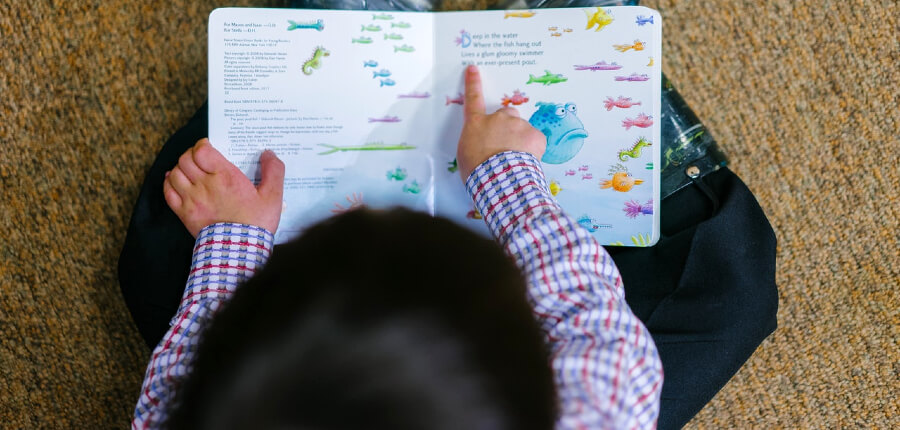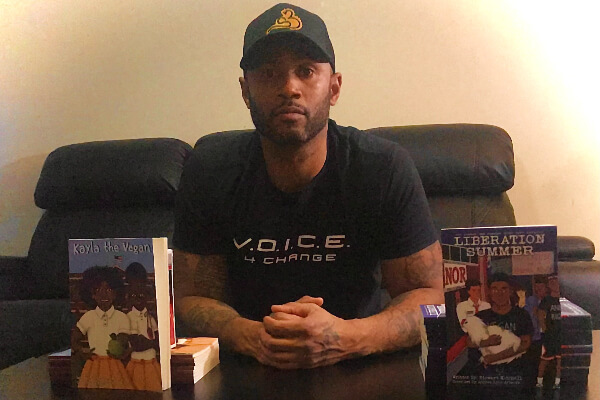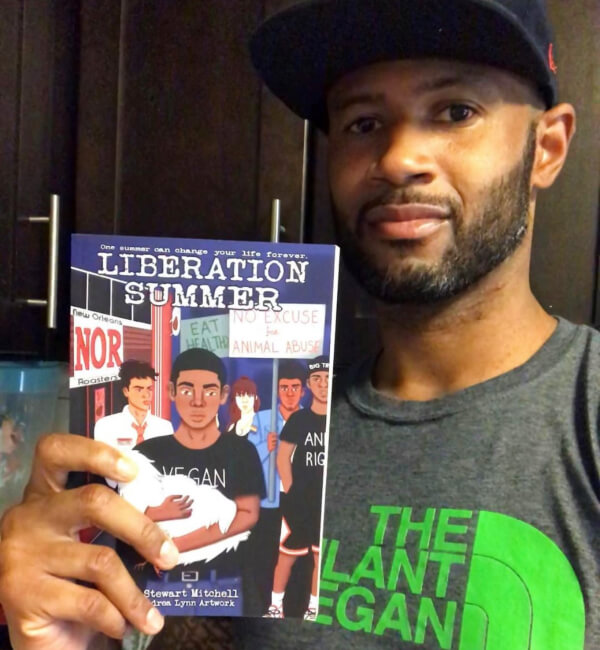“A word after a word after a word is power.”
—Margaret Atwood
If you’ve ever wanted to use your words to make the world a better place for animals, we’d like to introduce your new inspiration—author Stewart Mitchell!
Stewart went vegan in 2011, after working in the food-service industry got him thinking about what—or rather who—was on his plate. The human rights and animal rights activist—who’s now known to his more than 24,000 Instagram followers as Vigilante Vegan—realized that “being vegan wasn’t enough,” so he started organizing protests and brainstorming ways to empower more young people to create positive change for animals.
In 2017, Stewart self-published his first children’s book, Kayla the Vegan, about a young girl who shows her classmates how to be compassionate by eating healthy foods that don’t harm animals. Two years later, he published Liberation Summer, the story of a young adult named Jayden who learns about the cruelty in the meat industry and the existence of food deserts in low-income communities. Both books emphasize the importance of having empathy for humans and other animals alike.
We asked Stewart about his creative activism, the inspiration for his two books, his tips on writing for young readers, and more.
What inspired you to write Kayla the Vegan and Liberation Summer?
It’s important that we teach young children compassion and respect for all sentient beings, since they will be the ones to inherit the planet. I thought books would be a good resource for kids.
Where did you get the ideas for your books?
Kayla the Vegan was inspired by Genesis Butler, a young animal rights activist. Liberation Summer is loosely based on my own experiences working in the food service industry.
How does reading books about compassion for animals benefit children?
Adults always try to encourage children to read, and I thought if I could write a book about kids centered on veganism and make the characters relatable, it would be easy for them to understand why it’s important to extend love and compassion to animals.
What has been the response to your books?
I’ve gotten good and great responses from people from all walks of life and professions, especially for Kayla the Vegan. A lot of mothers have reached out to thank me for writing the book, which feels truly amazing!
What challenges do you face as a vegan author, and how do you overcome them?
One challenge was trying to get the books published through a company. Most publishers didn’t want children’s books, and the ones that did kindly passed on my idea. That’s one of the main reasons why the books were self-published.
How do you inform young people about animal issues in your books?
I think I’ve simplified the message enough so that people can understand how easy it is to avoid harming animals, while introducing alternatives to animal-derived food and clothing. Kayla speaks in a compassionate way that doesn’t berate people for not being vegan—she helps children understand her message through love and kindness. Liberation Summer shows people how you can systemically change things by setting an example, without shoving ideas or beliefs down others’ throats.
Do you experience “compassion fatigue”? If so, how do you remedy it?
We live in a very uncompassionate world, so it’s easy to experience fatigue or burnout. I try to find new ways to advocate for animals consistently, whether it’s through writing, creating activism stickers, or taking action through my latest venture, V.O.I.C.E.4Change, which centers activism around performing arts. We use spoken word, poetry, and song to advocate for animals.
I try to make activism engaging and fun, whether it’s through a book, poetry, or another form of art. We have to find new ways to get people’s attention and make them aware of the suffering endured by animals so that they’ll make better and more ethical choices! I think repeating the same methods can eventually lead to burnout, and we have to learn how to make activism fun.
What advice would you give someone who wants to write compassionate children’s books?
Think of ways you would have wanted someone to talk to you when you were a child, and put that down on paper.
Is there anything else you’d like readers to know about you or your work?
I’m not perfect. I do the best that I can with my writing. I write books because I care deeply about children and animals. Sometimes it’s hard to get adults to listen to what we’re saying with regard to animals and our planet because they don’t want to do the work necessary to create change. Children’s minds are still developing, and they’re curious about the world around us. It’s our responsibility to give them the proper tools and knowledge to create positive change.
Inspiring stories about young people showing kindness to animals can offer a fun and easy way to motivate children to be more compassionate toward others. Browse PETA’s ever-growing list of animal-friendly children’s books for new titles to share with the young people in your life.








